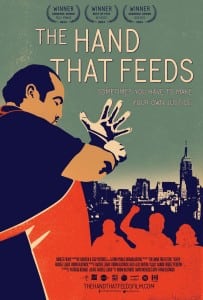An early 2000s mockumentary, A Day Without a Mexican, explored the essential role of Latinos in the California economy. One magical day, 14 million people, many of them the supposedly low-skilled, often low-visibility, certainly low-wage workers who keep the world’s fifth-largest economy humming, mysteriously disappear. With the Golden State’s golden dream-life threatened, a Hollywood ending contrives to bring them back when those left behind, even the latter day 1 per cent, express regret for their failure to notice, much less love, their brown-skinned neighbors.
The Hand That Feeds, due up on Friday, June 12, at the Philipstown Depot Theatre as the last of this season’s Depot Docs films, sets out to show not what happens when such workers disappear, but when they confront the system that disappears them behind walls of economic need, immigration status and class and color bias. Written, produced and directed by husband-and-wife filmmakers Rachel Lears and Robin Blotnick, The Hand That Feeds follows the efforts of a group of mostly undocumented Mexican workers at the Hot and Crusty bakery/deli on 63rd Street and Second Avenue in Manhattan’s Upper East Side to get redress from their employer for considerable grievances.

The film focuses on their unlikely leader, the soft-spoken and unprepossessing Mahoma Lopez, and on the organizing acumen and fierce support brought to the cause by their equally unlikely advocates, the Laundry Workers Center. Lears and Blotnick found their protagonists when they were working with the Occupy Wall Street media project in 2012. Lopez and his 20-some co-workers had filed complaints with the New York State Department of Labor about illegal and unsafe working conditions and wage theft, and when those went unanswered, they reached out to unions, who said they were too small a number to organize.
They finally got a positive response from the Laundry Workers Center, originally founded by immigrant worker Virgilio Aran to fight for the rights of laundromat workers. Guided and encouraged by the LWC and their young lawyer, Ben Dictor, the Hot and Crusty crew eventually took their case to the National Labor Relations Board and voted to form a union.

The filmmakers are Brooklynites clearly at home with city life and just as clearly able to win the trust of people whose lives as workers and wage earners, many supporting families, are at high risk in post-9/11, post–Great Recession USA. And while keeping the story of the workers’ struggle with their employer and with their own fears and vulnerabilities at the center of the film, they also frame it in the political, social and economic contexts that gave rise to the Occupy movement, and the even larger historical context of immigrant labor and workers’ rights in this country.
In the end, one is left with the hopeful and inspired feeling that if there is always a seemingly indomitable corporate Goliath lording over the workplace, there will always be a clever, unintimidated, resolved and resourceful David or Davida willing to step up and call him to account.
The Hand That Feeds will be shown at the Philipstown Depot Theatre, Garrison’s Landing, on Friday, June 12, 7:30 p.m. The screening will be followed by a Q-and-A and reception with special guests, filmmakers Rachael Lears and Robin Blotnick.
